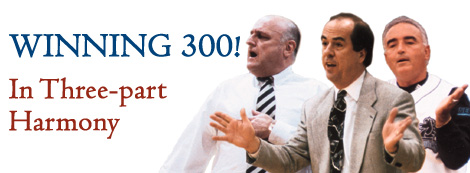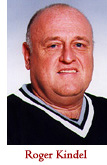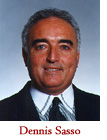

|
. |

They arrived at Fairleigh Dickinson from different paths, but individually and collectively they’ve made history. In what is believed to be a first for a university, within one year Fairleigh Dickinson will have three coaches reach their 300th career win. What further distinguishes this feat is that all 900-plus wins have been earned at FDU. Last February, Division I basketball coach Tom Green was the first to reach the milestone, and he was joined by Division I baseball coach Dennis Sasso in April. And, now, Division III basketball coach Roger Kindel is about to secure his place at the lofty perch. Tom Green
In the 11 seasons before Tom Green became the head basketball coach in 1983, Fairleigh Dickinson enjoyed just two winning campaigns. Since he arrived, Green has led the Knights to 14 winning seasons in his 18 years, three Northeast Conference (NEC) Tournament championships, three trips to the NCAA Tournament and one berth in the National Invitational Tournament (NIT). Along the way he has become the winningest coach in Fairleigh Dickinson history and the winningest coach in NEC history. 
But win number 300 did not come easily or quickly for Green. In the midst of an up-and-down season, the Knights were losing by eight points to Long Island University with less than six minutes to play, before a 17-8 run narrowly (59-58) secured Green’s record achievement. Despite all the attention and accolades, Green was preparing his team for the stretch drive and did not want to dwell on the accomplishment. “At the time, I didn’t get to think much about it,” Green says. “Having some time to reflect about it, there are no easy games at this level of play. It means I’ve been blessed with some good assistant coaches who have brought in some good players.” True enough, but as one reporter wrote of Green, “It takes a good head coach to blend that talent and make it a successful team.” Green’s assistant coach for 11 seasons, Ellonya “Tiny” Green (no relation), adds that what has impressed him is that Green has won over the years with many different types of players and different styles. Tom Green, who was a captain and point guard for Syracuse University, began his coaching career as an assistant at Drew University before returning to Syracuse University. There, he served as a graduate assistant under former FDU athletics director Roy Danforth and was a major part of four NCAA Tournament teams, including the 1974–75 squad that reached the Final Four. Green followed Danforth to Tulane University and, in his seven seasons as assistant coach, the team landed two NIT berths. In 1983, he was named the head coach at Fairleigh Dickinson. The victories began mounting as did the honors. Green has twice been named NEC Coach of the Year and New Jersey Sports Writers Coach of the Year. He also has been named New Jersey Coaches Association Coach of the Year three times. When Green arrived at FDU, he had little knowledge of the University and says he didn’t dream he would be here for 18 years. Nor could he have possibly dreamed he would one day be coaching his son at the University. A freshman on the team last year, Brad was just one year old when his father became head coach. With Brad on the squad, Green says, “It made it a family affair. It was fun to have him here on a daily basis.” Brad and the Knights are looking to build on Coach Green’s winning tradition this season, and the coach is as focused as ever. “As long as the school will have me, I’ll look forward to being here. I’m very happy at FDU, and I’m hoping to continue to win basketball games.” Roger Kindel
It is often hard to get Roger Kindel to take the credit he deserves. He’s been at the helm of the same Division III basketball program for 24 seasons. Along the way, he’s gone to the postseason 10 out of the past 18 years, and, as the 2001–2002 season began, he was just eight wins away from 300. Sure, he frequently can be heard joking about how hard he works or how he is “the most organized human being you will ever meet”; but when seriously contemplating the key to his success, the cornerstone of his career at FDU, he replies modestly, “I have had very good players and assistant coaches.” That’s it. Nothing more. No lengthy discussion on scouting, recruiting or Xs and Os. Just credit to those who have surrounded him over the years. |
||
|
Only after he’s pressed with the same question does he relent. “I have a very good work ethic that I try to filter down to my assistants and players,” Kindel says. “I think my parents instilled that in me at a young age. I didn’t come from a lot of money, and I had to work hard for what I got.” That determination has certainly paid off. During his tenure, he’s mentored 11 players who have scored over 1,000 points and has been named New Jersey Coach of the Year four times by various organizations and Middle Atlantic Conference Coach of the Year as well. Kindel coached the program’s only two 20-win teams and, since becoming a full-time coach in 1989, he has compiled a 172-136 record, while guiding the Devils to seven postseason appearances. He credits those who coached him for helping to mold him into what he is today: his coach at Roselle, N.J., High School, Dick Young, and his coaches at Seton Hall University, Richie Regan and Bill Raftery. “They were role models and the main reasons that I gravitated to coaching.” In turn, he has passed on his most valued ideals. His assistant coach of five years, Peter Marion, says, “What I’ve learned from Roger is to be prepared for anything, to have a good work ethic and to strive to win.” His players have been a big part of what has made Fairleigh Dickinson such a special place for Kindel. “I like the student-athletes I’ve dealt with here,” he says. “They’ve been great. I’ve had a lot of good players and good students.” Perhaps the player Kindel is most proud of never scored a point for his college team. His daughter, Heidi, BA’01 (F-M), who earned her bachelor’s degree from Fairleigh Dickinson last year and is now a graduate student, was a standout on the women’s basketball team and finished with more than 1,200 points, the fourth highest total in team history. Kindel says providing a stable environment for his family is part of the reason he has spent 24 seasons at Florham-Madison. “I did not want to be moving from place to place like many college coaches,” he explains. “I wanted my family to have one place to live. I’m a New Jersey person, born and bred. I’ve always wanted to stay in New Jersey.” Dennis SassoDennis Sasso’s first reaction isn’t to ponder philosophically about the significance of winning 300 games. “It means I’m getting older,” he jokes. But in typical selfless fashion he quickly adjusts gears to pay tribute to all those who have supported him. “All those wins reflect the hard work and effort of a lot of men who have contributed to Fairleigh Dickinson baseball over the last 16 years.” Still, Sasso has been the guiding force, and his knowledge and inspiration have led the Knights baseball team to two Northeast Conference (NEC) championships, four regular season titles and a divisional crown. In addition, the three-time NEC Coach of the Year has groomed numerous players for professional baseball and played a major role in the development of hundreds of student-athletes’ lives. 
Not bad for someone who never planned on a career in coaching. After serving in the U.S. Army, Sasso had planned to attend Fordham Law School, when he was contacted by Essex Catholic High School. The team’s baseball coach was ill, and Sasso was asked to fill in. The former coach never returned, and Sasso wound up teaching Latin, French, English and mathematics, while coaching baseball, football and basketball. Sasso has not only reached the 300-win mark at FDU, he accomplished the same feat on the high school level, coaching at Essex Catholic, then at Middletown South High School and Nutley High School. In 1986, much to Fairleigh Dickinson’s good fortune, Sasso decided the time was right to jump to the college level. Since then, he’s become the winningest coach in FDU baseball history, and on April 14, 2001, 15 years after his first victory, Sasso garnered number 300 when his Knights defeated NEC rival Mount St. Mary’s, 12-8. Then-senior pitcher Mike Wassong, BS’01 (T-H), who earned the win and was later signed by the Toronto Blue Jays, says, “It was great to be part of something that means so much to him. He’s meant a lot to us. His experience, his knowledge of the game and his abilities to communicate and relate to the players are outstanding.”
Sasso credits his father for launching his successful career. “My father taught me the basics of baseball and many life lessons that can be transferred from athletics,” he says. Through the years Sasso also has surrounded himself with other great baseball minds and good people who have supported him. “I’ve been blessed with some outstanding young men, wonderful coaches and an outstanding support staff over the last 16 years,” says Sasso. “Coaches like Tony Miele; Ed Ward; Greg Kearney; Don Falciglia; Mike Mongiello, AA’88 (T-H), BS’94 (T-H); Jerry Defabbia, BS’93 (T-H); and now Don Hahn and John Kroeger have been every bit a part of each victory.” Sasso also credits the four athletics directors he’s served — Roy Danforth, Gerry Oswald, Ann Gulino and Steve Hurlbut — and past and present members of the administration. “It’s been a great relationship here at FDU and I look forward to continuing it.” |
||
|
FDU Magazine Directory | Table of Contents | FDU Home Page | Alumni Home Page | Comments |
|||